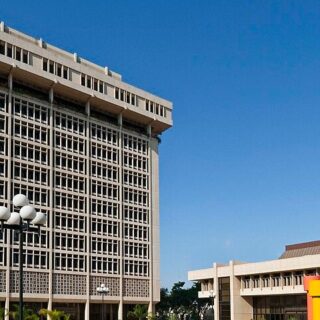The Government of The Bahamas has reported a fiscal deficit of 0.5% of gross domestic product (GDP) for the budget year ending June 30, 2025, according to official data released by the Ministry of Finance. The figure falls within the government’s target range of 0.3% to 0.7%, and represents a substantial reduction from the 13.7% deficit recorded in 2021.
The announcement was made by the Office of the Prime Minister and confirmed in the 2025 Fiscal Strategy Report. The report outlines the government’s medium-term fiscal framework and includes projections for revenue, expenditure, and debt management through FY2028/2029.
The fiscal outcome for FY2024/2025 reflects a broader national strategy aimed at economic resilience and sustainable development. Recurrent spending was projected at 20.8% of GDP, while capital expenditure remained stable at 2.3% of GDP. Revenue collections reached an estimated 23.6% of GDP, with expectations to grow to 25% over the next three years.
The fiscal consolidation efforts have received international recognition. On September 26, 2025, S&P Global Ratings upgraded The Bahamas’ long-term foreign and local currency sovereign credit ratings to ‘BB-’ from ‘B+’. The agency cited strengthened economic performance, improved tax compliance, and a narrowing fiscal deficit as key drivers behind the upgrade. S&P projects that the country’s debt-to-GDP ratio will decline to 66.3% by the end of 2025, down from 77.8% in 2020.
The ratings action follows a series of fiscal reforms and policy measures implemented since 2021, when the country faced one of its most severe fiscal challenges in recent history. According to the Bahamas Budget Website, the FY2025/2026 budget projects a surplus of $75 million, or 0.5% of GDP, driven by targeted reforms in tax compliance and expenditure control.
Prime Minister Philip Davis, who also serves as Minister of Finance, stated that the fiscal progress enhances the country’s ability to invest in infrastructure, education, healthcare, and renewable energy. He emphasized that reduced debt servicing costs contribute to national development and improve the country’s attractiveness to international investors and trade partners.
The Bahamas’ fiscal trajectory has been closely monitored following pandemic-era deficits and increased borrowing. Historical data from the Central Bank of The Bahamas shows that the government budget deficit averaged -2.84% of GDP from 1990 to 2024, with a record low of -13.1% in 2021.
While the government has faced scrutiny over discrepancies in monthly fiscal reporting—such as a $137.5 million swing in April 2025 figures later revised by the Ministry of Finance—the overall annual deficit remains within the projected range.
The fiscal improvement aligns with broader macroeconomic trends, including growth in cruise tourism and investment across the Family Islands. S&P expects GDP growth of 2.1% in 2025, supported by revised data collection methods from the Bahamas National Statistical Institute and ongoing energy sector reforms.
The Bahamas’ fiscal performance and credit rating upgrade are expected to influence investor sentiment and international engagement, particularly with partners in the United States and the United Kingdom. The government has indicated that it will continue to pursue policies aimed at maintaining fiscal discipline and promoting sustainable economic growth.
Central Bank of The Bahamas. Photo credit: InfiCladas from Wikipedia.







